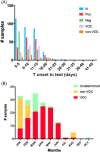Use of saliva and RT-PCR screening for SARS-CoV-2 variants of concern: Surveillance and monitoring
- PMID: 35524465
- PMCID: PMC9347783
- DOI: 10.1002/jmv.27839
Use of saliva and RT-PCR screening for SARS-CoV-2 variants of concern: Surveillance and monitoring
Abstract
Genomic surveillance has been applied since the beginning of the COVID-19 pandemic to track the spread of the virus, leading to the characterization of multiple SARS-CoV-2 variants, including variants of concern (VOC). Although sequencing is the standard method, a rapid molecular test for screening and surveillance of VOC is considered for detection. Furthermore, using alternative saliva as specimen collection facilitates the implementation of a less invasive, self-collected sample. In this study, we applied a combinatory strategy of saliva collection and reverse transcription polymerase chain reaction (RT-PCR) for SARS-CoV-2 VOC detection. Saliva samples from patients attending a tertiary hospital with suspected COVID-19 were collected and SARS-CoV-2 RNA was detected using SARS-CoV-2 RT-qPCR reagent kit (PerkinElmer). Positive saliva samples were screened for SARS-CoV-2 VOC with previously described RT-PCR for Alpha, Beta, and Gamma variants. Saliva samples were positive in 171 (53%) of 324 tested. A total of 108 (74%) from positive samples were also positive for VOC by RT-PCR screening. Those samples were found between January and August 2021. This approach allowed us to successfully use an alternative and complementary tool to genomic surveillance to monitor the circulation of SARS-CoV-2 VOC in the studied population.
Keywords: SARS-CoV-2; saliva; surveillance; variants of concern.
© 2022 Wiley Periodicals LLC.
Conflict of interest statement
The authors declare no conflicts of interest.
Figures

Similar articles
-
Effectiveness and cost-effectiveness of four different strategies for SARS-CoV-2 surveillance in the general population (CoV-Surv Study): a structured summary of a study protocol for a cluster-randomised, two-factorial controlled trial.Trials. 2021 Jan 8;22(1):39. doi: 10.1186/s13063-020-04982-z. Trials. 2021. PMID: 33419461 Free PMC article.
-
Emergency SARS-CoV-2 Variants of Concern: Novel Multiplex Real-Time RT-PCR Assay for Rapid Detection and Surveillance.Microbiol Spectr. 2022 Feb 23;10(1):e0251321. doi: 10.1128/spectrum.02513-21. Epub 2022 Feb 23. Microbiol Spectr. 2022. PMID: 35196812 Free PMC article.
-
Clinical Performance of Direct RT-PCR Testing of Raw Saliva for Detection of SARS-CoV-2 in Symptomatic and Asymptomatic Individuals.Microbiol Spectr. 2022 Dec 21;10(6):e0222922. doi: 10.1128/spectrum.02229-22. Epub 2022 Nov 21. Microbiol Spectr. 2022. PMID: 36409097 Free PMC article.
-
An Update on Detection Technologies for SARS-CoV-2 Variants of Concern.Viruses. 2022 Oct 22;14(11):2324. doi: 10.3390/v14112324. Viruses. 2022. PMID: 36366421 Free PMC article. Review.
-
The role of children in transmission of SARS-CoV-2 variants of concern within households: an updated systematic review and meta-analysis, as at 30 June 2022.Euro Surveill. 2023 May;28(18):2200624. doi: 10.2807/1560-7917.ES.2023.28.18.2200624. Euro Surveill. 2023. PMID: 37140450 Free PMC article.
Cited by
-
Multiplexed discrimination of SARS-CoV-2 variants via duplex-specific nuclease combined MALDI-TOF MS.Anal Bioanal Chem. 2024 Mar;416(8):1833-1842. doi: 10.1007/s00216-024-05202-2. Epub 2024 Feb 17. Anal Bioanal Chem. 2024. PMID: 38367041
-
Challenges and Opportunities for Global Genomic Surveillance Strategies in the COVID-19 Era.Viruses. 2022 Nov 16;14(11):2532. doi: 10.3390/v14112532. Viruses. 2022. PMID: 36423141 Free PMC article. Review.
-
Atomically dispersed Mn boosting photoelectrochemical SARS-CoV-2 spike protein immunosensing on carbon nitride.J Environ Chem Eng. 2022 Dec;10(6):108697. doi: 10.1016/j.jece.2022.108697. Epub 2022 Oct 3. J Environ Chem Eng. 2022. PMID: 36213529 Free PMC article.
References
-
- Romano CM, De Jesus J, Clara Felix A, et al. Real‐time PCR protocol to screen for SARS‐COV‐2 variants of concern (B.1.1.7, P.1 and B.1.1.35). Protocols.io. , 10.17504/protocols.io.bszbnf2n - DOI
Publication types
MeSH terms
Substances
Supplementary concepts
LinkOut - more resources
Full Text Sources
Medical
Miscellaneous

